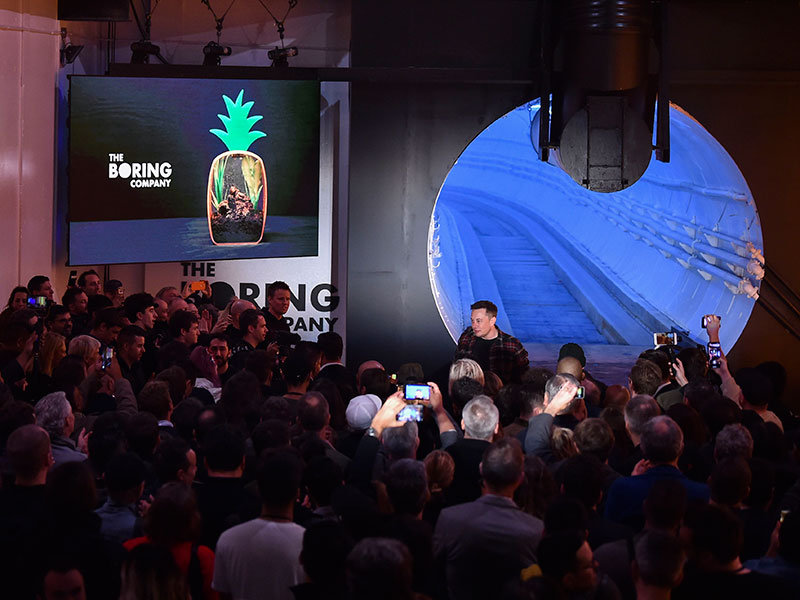Elon Musk reveals congestion combatting prototype: the Boring Company’s test tunnel
The Boring Company, established two years ago by Tesla CEO Elon Musk, has revealed an underground ‘loop’ track that promises to revolutionise urban transport

Tesla CEO Elon Musk set out his final vision for the Boring Company's tunnel to reporters: modified electric cars, guided by “skates”, will use a series of street-level elevators to lower themselves into an extensive underground network
On December 19, Elon Musk unveiled a one-mile test tunnel under Hawthorne, California – the first major development launched by the entrepreneur’s tunnelling venture, the Boring Company. In 2016, Musk tweeted his plans to “build a tunnel boring machine and just start digging” in order to alleviate traffic congestion. Those plans are now coming to fruition.
During a 30-minute presentation – shared via a live webcast – Musk revealed a 1.14-mile stretch of his ambitious concept. The tunnel, which is 3.7 metres in diameter, follows a path that runs under the suburbs of Hawthorne, which is home to both SpaceX and the Boring Company. Guests were given free rides along the Boring Company’s test tunnel in a modified Tesla Model X as part of the grand opening.
Several conurbations have expressed an interest in Elon Musk’s congestion combatting vision, and Musk hopes that a citywide network can be completed by 2028
With the journey being described by participants as “a little bumpy”, Musk explained this was due to problems with a paving machine and assured the crowd that the final product would be “as smooth as glass”. Musk claimed the total price tag of the completed segment was around $10m, though he insisted excavating a mile of tunnel using “traditional” engineering methods would command costs of up to $1bn.
“Tunnels in my view are the only solution to urban congestion because we have a 2D road network and buildings are 3D – and everyone wants to pile in and out of these buildings at the same time,” Musk told CBS This Morning.
Several conurbations have expressed an interest in Musk’s congestion combatting vision, and Musk hopes that a citywide network can be completed by 2028. Still, industry experts have expressed their doubts.
Traffic is driving me nuts. Am going to build a tunnel boring machine and just start digging…
— Elon Musk (@elonmusk) December 17, 2016
Jack Stewart, transport writer for Wired, told the BBC: “Elon Musk has this amazing ability to put on a great show… But in reality what he has revealed is a concrete tunnel, it could be a sewer… He’s got an awful long way to go.”
Musk set out his final vision to assembled reporters: modified electric cars, guided by “skates”, will use a series of street-level elevators to lower themselves into an extensive underground network, where speeds of 150mph will be possible. Musk added that passenger’s cars could be fitted with retractable side wheels to enable vehicles to pass through the loop autonomously. Current test runs are far slower, however, reaching speeds of roughly 40mph.













